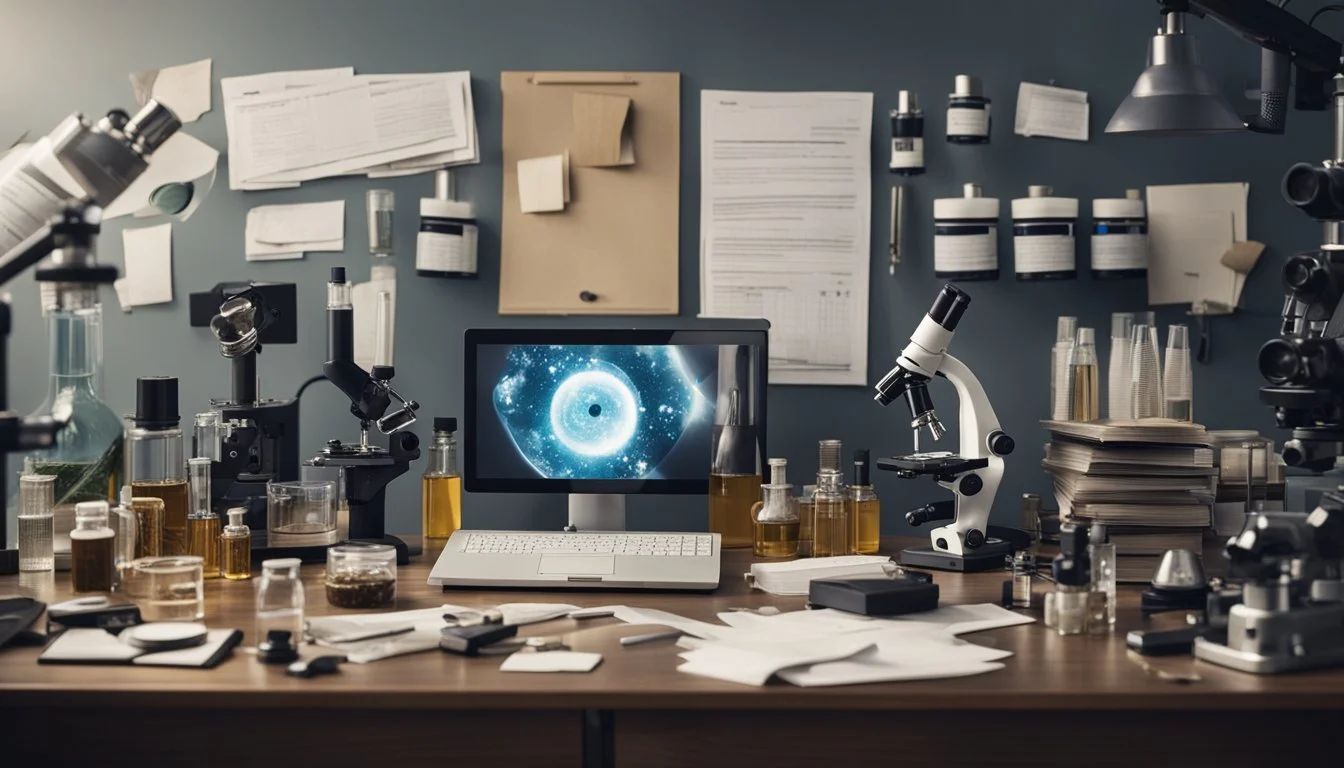7 True Crime Documentaries About Scientists
Unveiling the Dark Side of Innovation
True crime documentaries offer a gripping exploration into real-life mysteries and the lengths taken to solve them. When scientists are central figures in these narratives, the blend of intrigue and intellectual challenge becomes even more pronounced. This unique subgenre illuminates the pivotal role that scientific rigor plays in unraveling some of the world’s most perplexing criminal cases.
By spotlighting these seven true crime documentaries focused on scientists, viewers gain a deeper understanding of the intersection between science and detective work. Whether through forensic breakthroughs or groundbreaking research, the contributions of these scientists have been instrumental in uncovering truths and delivering justice.
1) The Scientist and the Suicide
"3 Body Problem" (2024)
This Netflix series opens with a gripping investigation led by Da Shi and his team. They are mystified by a series of apparent suicides among scientists. Each death raises more questions than answers, adding layers of intrigue and suspense.
The compelling narrative weaves the suicides with a broader mystery that's threatening global stability. Each episode draws viewers deeper into a web of scientific and existential dilemmas. The realistic portrayal of the scientists' turmoil amplifies the tension.
Viewers are kept on edge as they navigate through cryptic messages and unsettling discoveries. Each twist and turn brings them closer to understanding the scientists' fates. Every detail meticulously unravels the psychological and scientific factors behind the suicides.
2) The Poisoner's Handbook (2014)
"The Poisoner's Handbook" is a gripping documentary that takes viewers back to the early 20th century. It explores the birth of forensic medicine during the Jazz Age in New York. Based on Deborah Blum's best-selling book, this film vividly portrays the work of pioneering toxicologists.
The documentary highlights the efforts of two key figures, Charles Norris and Alexander Gettler. Norris, the first appointed medical examiner of New York City, and Gettler, a forensic chemist, worked tirelessly to combat untraceable poisons used in crimes. Their innovative methods laid the groundwork for modern forensic science.
Along with showcasing their breakthroughs, "The Poisoner's Handbook" delves into notable cases. It illustrates how these early forensic scientists tackled poisonings and solved crimes that baffled their contemporaries. Through these stories, viewers gain insight into how forensic science has evolved.
In addition to its historical context, the documentary includes dramatic recreations. These scenes bring to life the challenges and groundbreaking discoveries of Norris and Gettler. It provides a fascinating glimpse into the dangerous and often deadly world of early toxicology.
For more information, visit The Poisoner's Handbook on Wikipedia.
3) A Crime to Remember (2013-2018)
"A Crime to Remember" offers a retrospective on notable criminal cases from history. Created by Christine Connor, this series aired from 2013 to 2018 and is known for its meticulous attention to detail and historical accuracy.
The show meticulously recreates the era in which each crime occurred, employing period-specific settings and costumes. This immersive approach helps viewers understand the societal context of the time.
Episodes feature crimes that have had a significant impact on forensic science and criminal psychology. Expert interviews and archival footage are used to provide a comprehensive view of each case.
The series not only recounts the events but delves into the investigative techniques that were employed during those times. This makes it particularly interesting for those fascinated by the development of forensic methods.
More information is available here.
4) Hunting Warhead (2019)
Hunting Warhead is a chilling podcast that delves into the investigation of a global child exploitation ring. Released in 2019, it brings to light the harrowing work of journalists and law enforcement officials as they uncover the darkest corners of the internet.
The podcast is hosted by Daemon Fairless and involves collaboration between CBC Podcasts and the Norwegian newspaper VG. It tracks down investigators, survivors, and even the criminals involved. This combination provides listeners with a thorough understanding of the complexities and the emotional toll of such investigations.
One of the key focuses of Hunting Warhead is the effort of authorities and journalists to identify and track down the individual known as Warhead. The podcast offers insight into the advanced techniques and international cooperation required to bring such perpetrators to justice.
By highlighting the impact on victims and the psychological, emotional, and physical issues they face, Hunting Warhead provides a sobering look at the aftermath of these crimes. It emphasizes the importance of continued vigilance and support for survivors of such heinous acts.
For more information, visit the Wikipedia page for Hunting Warhead.
5) Outsmarting the System
The Catcher Was a Spy (2018)
This documentary profiles Moe Berg, a professional baseball player turned spy during World War II. Berg utilized his athletic career as cover to gather intelligence on Nazi Germany's atomic bomb program. His remarkable ability to outsmart the system and conceal his true mission exemplifies a unique overlap of sports and espionage. More on IMDb.
Project Nim (2011)
Project Nim explores the life of a chimpanzee raised as a human child as part of a 1970s research project. The scientist behind the project, Herbert Terrace, aimed to teach Nim sign language. This documentary sheds light on the ethical ambiguity and the researcher’s attempt to outmaneuver established scientific protocols. More on IMDb.
Three Identical Strangers (2018)
This film tells the astonishing story of triplets separated at birth and unknowingly placed into different adoptive families as part of a secret scientific study. The documentary delves into how the orchestrating scientists manipulated the lives of these brothers, revealing a dark chapter in psychological research. More on IMDb.
American Anarchist (2016)
This documentary focuses on William Powell, the author of "The Anarchist Cookbook," a controversial manual on bomb-making and sabotage. Powell wrote the book as a teenager, and it became an unintended blueprint for criminal activities. The film examines the lasting impact of his work and his struggle with its misuse by others. More on IMDb.
The Iceman Tapes: Conversations with a Killer (1992)
Richard Kuklinski, a mafia hitman, led a double life as a devoted family man and prolific contract killer. With education in chemistry, he used various toxins to evade detection and forensic scrutiny. The documentary features interviews with Kuklinski, providing insight into his methods and how he manipulated forensic techniques. More on IMDb.
6) The Mind of a Murderer
"The Mind of a Murderer" (2015) delves into the psychological profiles of convicted killers. The series features Dr. Michelle Ward, a criminal psychologist, who interviews murderers to uncover the motivations and thought processes behind their crimes.
Each episode provides a deep dive into different cases, shedding light on the complex nature of criminal minds.
Ward uses her background in psychology to dissect the minds of these criminals, aiming to understand the triggers and circumstances that led to their actions.
Viewers gain insight into different psychological conditions and factors that can contribute to criminal behavior. The series aims to provide a clear and factual portrayal, avoiding dramatizations that can distort the reality of these cases.
For more information about the series, visit Wikipedia.
7) Science of Death
"Science of Death" (2022) examines the intersection between scientific discovery and the underworld of crime. This documentary delves into the stories of scientists who became involved in criminal activities, either as perpetrators or victims.
Episodes explore cases such as Dr. Amy Bishop, a neurobiologist who committed a deadly shooting at the University of Alabama in 2010.
Another episode features the controversial life and death of Dr. Frank Olson, a CIA scientist whose mysterious fall from a New York hotel window in 1953 continues to spark debates and conspiracy theories.
The documentary also covers the case of Dr. J. Robert Oppenheimer, a physicist whose work on the atomic bomb raised moral and ethical questions about scientific responsibility.
Through interviews, archival footage, and expert analyses, "Science of Death" provides a comprehensive look at how the pursuit of scientific knowledge can sometimes lead to deadly consequences.
More information can be found on IMDb.
The Intersection of True Crime and Science
True crime documentaries about scientists intrigue audiences with their blend of forensic investigation and scientific expertise. They often highlight the critical role that scientific inquiry plays in solving real-world criminal cases.
Understanding the Appeal
The fascination with true crime and science stems from the intricate process of solving complex cases. Documentaries such as The Thin Blue Line demonstrate how meticulous methods can unravel mysteries.
Viewers are captivated by the precision and dedication required by scientists working alongside law enforcement. The appeal lies in the intellectual challenge and the reveal of hidden truths through scientific investigation.
These documentaries also spotlight how forensic techniques—such as DNA analysis—can lead to groundbreaking discoveries. The reliability of science in achieving justice adds a layer of credibility that engages the audience.
Real-Life Implications
The real-life implications of these true crime documentaries are significant. They underscore how forensic science plays a pivotal role in the legal system. For example, forensic experts often provide key evidence that can exonerate the innocent or convict the guilty.
By showcasing real cases, these documentaries raise awareness about the importance of accurate scientific practices. They also highlight the ongoing advancements in forensic technology that enhance the capability to solve crimes.
Moreover, these films often lead to public discussion about ethical considerations in forensic science, ensuring that the pursuit of justice remains just and scientifically sound.
How Science Aids Criminal Investigations
Science plays a crucial role in modern criminal investigations, employing various techniques to gather, analyze, and interpret evidence. Key areas include forensic techniques and psychological profiling.
Forensic Techniques
Forensic techniques involve the application of scientific methods to solve crimes. Techniques such as fingerprint analysis, DNA profiling, and ballistic testing are used to identify suspects and link them to crime scenes.
Fingerprint analysis examines unique patterns on fingers, ensuring reliable identification. DNA profiling, which analyzes genetic material, can match suspects to biological evidence found at crime scenes. Ballistic testing analyzes firearms and ammunition to determine their involvement in criminal activities.
Forensic scientists follow rigorous protocols to ensure the accuracy and reliability of their analyses. Edmond Locard's principle that "every contact leaves a trace" highlights the importance of meticulous evidence collection.
Psychological Profiling
Psychological profiling, also known as criminal profiling, uses behavioral science to understand and predict a criminal's actions. It involves analyzing crime scenes, victimology, and offender behavior patterns.
Profilers develop detailed profiles of potential suspects by examining factors such as method of operation, motive, and personality traits. This information helps law enforcement narrow down suspect lists and anticipate future actions.
Profiling can be particularly useful in serial crime cases, where patterns and behaviors are more pronounced. Insights gained through profiling contribute to capturing criminals and preventing future crimes by understanding their psychological drivers.







